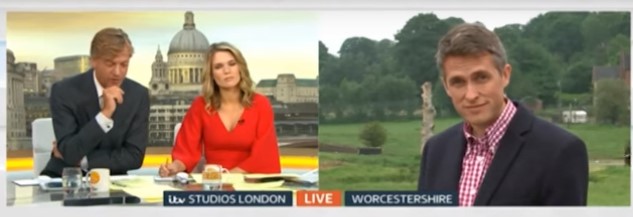Richard Madeley knows when to shut down an interview. On ITV’s Good Morning Britain, he abruptly brought his interview with Gavin Williamson, the Defence Secretary, to an end when Williamson refused to answer his question after four strikes.
The transcript below is a good study in equivocation, a technique used by politicians to avoid answering questions directly when those questions pose significant face-threats to the politician. Madeley was pressing Williamson on whether he regretted saying a casual, off-the-cuff remark about Russia telling them to “to shut up and go away”.
Time delays
Time delays can be very useful for politicians when equivocating. The delay in transmission between Williamson (GW), who was at an outside location in Worcestershire, and Madeley (RM), the interviewer, who was in the ITV studios in London, was between 2 to 3 seconds. This shows up in the pauses between Madeley’s questions and the start of Williamson’s answers (line 20), and also in the length of time that Williamson continues after Madeley attempts to interrupt.
... 01 RM: to shut up and go away 02 do you regret that now 03 do you think that was a bit too er informal 04 (2.8) 05 GW: well I’d like to pay tribute 06 to the health service [personnel 07 RM: [no sorry can you answer the question 08 GW: who’ve done an amazing [job 09 RM: [no no no no no no I’m 10 GW: [in (.) actually look- 11 RM: [I’m sure you do want to pay tribute to them 12 GW: we all-
Madeley reasserts his role as interviewer and uses the claim that he has asked a “straight question” to direct his interviewee to the question (lines 13-19). Williamson however, after a pause for the transmission, equivocates by talking about the nature of the attack rather than what he had said afterwards (lines 21-27). Madeley interrupts and a period of overlapping talk ensues (lines 28-35).
13 RM: no no Mr Williamson 14 I asked you a straight question 15 we can talk about 16 tributes to the to the health services in a minute 17 d’you regret using that kind of casual language 18 that’s the question 19 could you answer that question please 20 (2.3) 21 GW: well (.) what we saw 22 is we saw 23 an atrocious attack on British soil 24 er you saw (.) British erm y’know 25 British citizen and his daughter that were targeted 26 and actually how we responded to that is 27 the world united behind [Britain 28 RM: [yes d’you regret 29 GW: [and we showed Russia that we wouldn’t be divided 30 RM: [d’you regret telling Russia to shut up and go away 31 RM: Mr Williamson [please answer the question 32 GW: [and actually er by working 33 RM: Mr Williamson (.) Mr Williamson 34 you’re not- just not answering [the question 35 GW: [and by
Madeley then makes the claim (lines 36-49) that the question is on behalf of the viewers and not himself personally. This is the case with interviewers who are often merely “animators” of questions that have been “authored” elsewhere on behalf of “the principal” (Hutchby & Wooffitt 2008, p146). Williamson again refuses to engage with the question and instead repeats line about the nature of the attack (lines 51-55).
36 RM: and I w- 37 Mr Williamson 38 I’m asking the question 39 not on my behalf 40 but on behalf of our viewers 41 so on behalf of the viewers 42 would you please answer the question 43 do you now regret 44 telling (.) a nation state 45 to shut up 46 and go away 47 do you think that was too casual 48 an expression 49 could you please answer that question 50 (0.9) 51 GW: well I I think I think if er 52 I think that what everyone saw 53 is Russia’s attar- er actions 54 against our er our citizens in a er 55 in a city here in the United Kingdom 56 RM: yes you’re telling us [what we know 57 GW: [were absolutely beyond the pail 58 RM: we know what happened in the [city 59 GW: [what the government did
Madeley tries for the fourth and last time with the question. Williamson continues to equivocate.
60 RM: we know what happened in Salisbury 61 we know how atrocious it was 62 we know how close these people came to death 63 THE question is 64 I’ll try it one more time 65 do you regret using very casual Trumpesque language like 66 shut up and go away 67 please don’t tell me what happened 68 cause we know what happened 69 do you regret using that language 70 <that is the question> 71 GW: well what what was right 72 is actually we came together with our allies 73 to [make this absolutely clear to Russia 74 RM: [alright you’re not going to answer are you (.) okay 75 GW: [that they couldn’t act in that behaviour 76 RM: [alright no (.) okay (.) alright 77 GW: [and I think that was the right thing to do
Interview Terminated
At this point, Madeley realises he is not going to get a straight answer and abruptly terminates the interview (lines 78-84), a right that the interviewer has.
78 RM: [alright interview terminated 79 because you won’t answer the question 80 good luck with the the African elephant er project 81 that is an excellent thing to do 82 but erm 83 would be helpful if you answered a straight question 84 with a straight answer
One extra advantage that interviewers have is the right to comment on and discuss the interview in the studio afterwards, a right with the interviewee does not share. Here his co-presenter, Charlotte Hawkins (CH), closes the interview (lines 86-90) and names the interviewee which is standard practice after an interview. But this gives Madeley an opportunity to air his grievances (lines 91-98) with regard to the equivocation tactics shown by the interviewee.
85 86 CH: that was the er Defence Secretary 87 Gavin Williamson there 88 also joined by Major James Cohen 89 they were talking about troops being deployed to Malawi 90 and not talking about [what he had to say about Russia 91 RM: [what are they like 92 what are these politicians like 93 you give them a straight question 94 it would have been so easy to say 95 no I don’t 96 I think it was an appropriate expression 97 or to say yes probably on reflection 98 I should have perhaps been a little more formal RM: Richard Madeley GW: Defence Secretary Williamson CH: Charlotte Hawkins Overlap indicated by [
Following the interview, there was some criticism for Williamson in the media for not answering the question. Madeley himself was likened to the fictitious Alan Partridge due to his bumbling and ostentatious style of presenting. Madeley now has a new rule of “three strikes and you are out” for any politician who refuses to answer questions replacing the four strikes he gave Williamson here.
Good Morning Britain, ITV, 29th May 2018
http://www.itv.com/goodmorningbritain
Express and Star
https://www.expressandstar.com/news/politics/2018/05/30/in-future-gavin-just-say-no/
Hutcbyby, I. & Wooffitt, R. (2008) Conversation Analysis. Cambridge: Polity Press




Leave a Reply
You must be logged in to post a comment.